Contemporary Issues in Consumer Research Essay
VerifiedAdded on 2020/01/21
|11
|3366
|61
Essay
AI Summary
This essay examines the contemporary issue of ethical consumerism within the context of consumer research. It defines ethical consumerism from various perspectives, highlighting the growing importance of environmentally friendly and ethically sourced products. The essay explores several facets contributing to the rise of ethical consumerism, including changing consumer perceptions regarding environmental impact, human rights concerns (e.g., child labor), and animal welfare. While acknowledging that not all consumers prioritize ethical purchasing due to factors like income and cost, the essay emphasizes the significant marketing opportunities presented by this trend. Companies can leverage ethical consumerism by creating advertisements that highlight their ethical practices, allowing them to set prices strategically and build stronger customer loyalty. The essay concludes by stressing the importance for businesses to consider ethical consumerism to avoid negative impacts on their brand and sales.
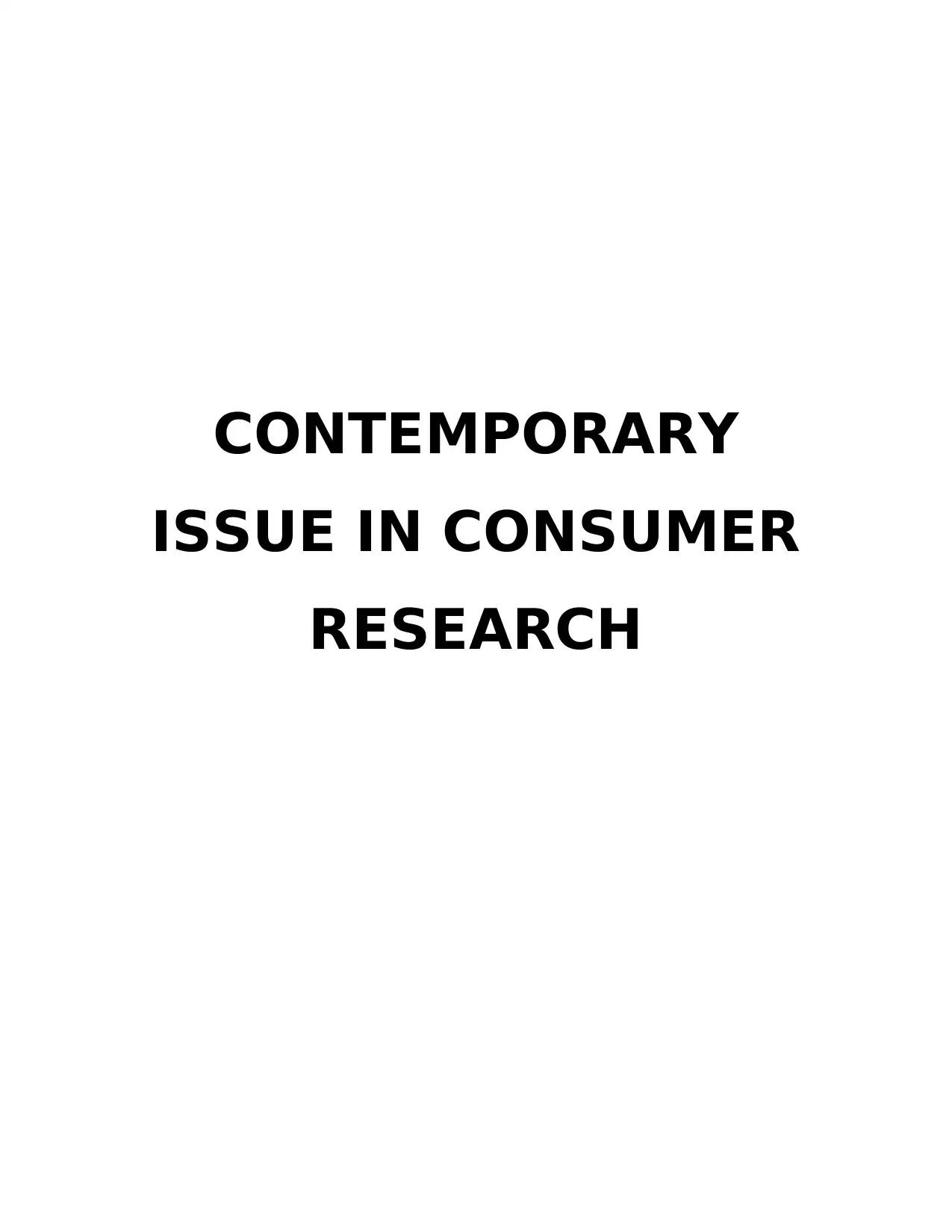
CONTEMPORARY
ISSUE IN CONSUMER
RESEARCH
ISSUE IN CONSUMER
RESEARCH
Paraphrase This Document
Need a fresh take? Get an instant paraphrase of this document with our AI Paraphraser
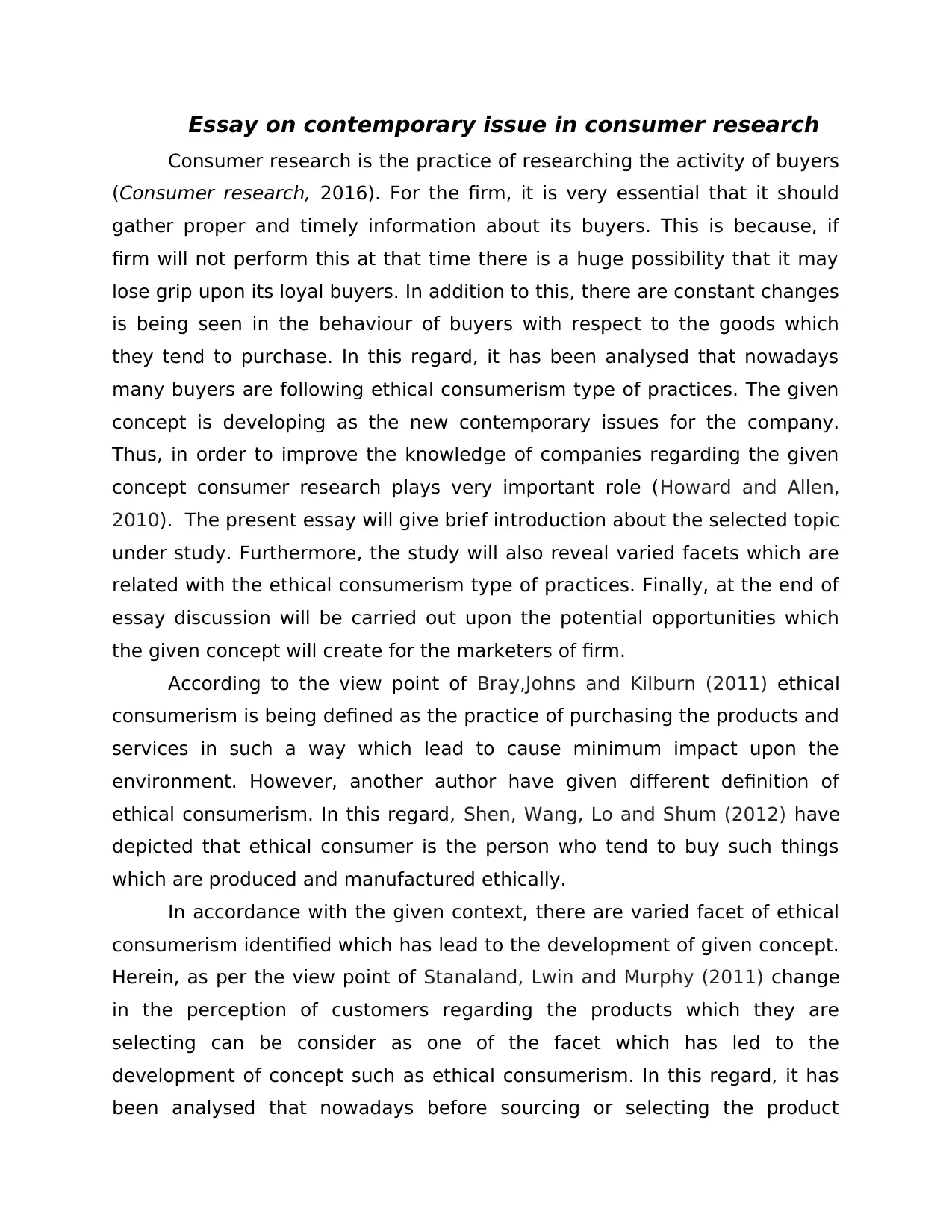
Essay on contemporary issue in consumer research
Consumer research is the practice of researching the activity of buyers
(Consumer research, 2016). For the firm, it is very essential that it should
gather proper and timely information about its buyers. This is because, if
firm will not perform this at that time there is a huge possibility that it may
lose grip upon its loyal buyers. In addition to this, there are constant changes
is being seen in the behaviour of buyers with respect to the goods which
they tend to purchase. In this regard, it has been analysed that nowadays
many buyers are following ethical consumerism type of practices. The given
concept is developing as the new contemporary issues for the company.
Thus, in order to improve the knowledge of companies regarding the given
concept consumer research plays very important role (Howard and Allen,
2010). The present essay will give brief introduction about the selected topic
under study. Furthermore, the study will also reveal varied facets which are
related with the ethical consumerism type of practices. Finally, at the end of
essay discussion will be carried out upon the potential opportunities which
the given concept will create for the marketers of firm.
According to the view point of Bray,Johns and Kilburn (2011) ethical
consumerism is being defined as the practice of purchasing the products and
services in such a way which lead to cause minimum impact upon the
environment. However, another author have given different definition of
ethical consumerism. In this regard, Shen, Wang, Lo and Shum (2012) have
depicted that ethical consumer is the person who tend to buy such things
which are produced and manufactured ethically.
In accordance with the given context, there are varied facet of ethical
consumerism identified which has lead to the development of given concept.
Herein, as per the view point of Stanaland, Lwin and Murphy (2011) change
in the perception of customers regarding the products which they are
selecting can be consider as one of the facet which has led to the
development of concept such as ethical consumerism. In this regard, it has
been analysed that nowadays before sourcing or selecting the product
Consumer research is the practice of researching the activity of buyers
(Consumer research, 2016). For the firm, it is very essential that it should
gather proper and timely information about its buyers. This is because, if
firm will not perform this at that time there is a huge possibility that it may
lose grip upon its loyal buyers. In addition to this, there are constant changes
is being seen in the behaviour of buyers with respect to the goods which
they tend to purchase. In this regard, it has been analysed that nowadays
many buyers are following ethical consumerism type of practices. The given
concept is developing as the new contemporary issues for the company.
Thus, in order to improve the knowledge of companies regarding the given
concept consumer research plays very important role (Howard and Allen,
2010). The present essay will give brief introduction about the selected topic
under study. Furthermore, the study will also reveal varied facets which are
related with the ethical consumerism type of practices. Finally, at the end of
essay discussion will be carried out upon the potential opportunities which
the given concept will create for the marketers of firm.
According to the view point of Bray,Johns and Kilburn (2011) ethical
consumerism is being defined as the practice of purchasing the products and
services in such a way which lead to cause minimum impact upon the
environment. However, another author have given different definition of
ethical consumerism. In this regard, Shen, Wang, Lo and Shum (2012) have
depicted that ethical consumer is the person who tend to buy such things
which are produced and manufactured ethically.
In accordance with the given context, there are varied facet of ethical
consumerism identified which has lead to the development of given concept.
Herein, as per the view point of Stanaland, Lwin and Murphy (2011) change
in the perception of customers regarding the products which they are
selecting can be consider as one of the facet which has led to the
development of concept such as ethical consumerism. In this regard, it has
been analysed that nowadays before sourcing or selecting the product
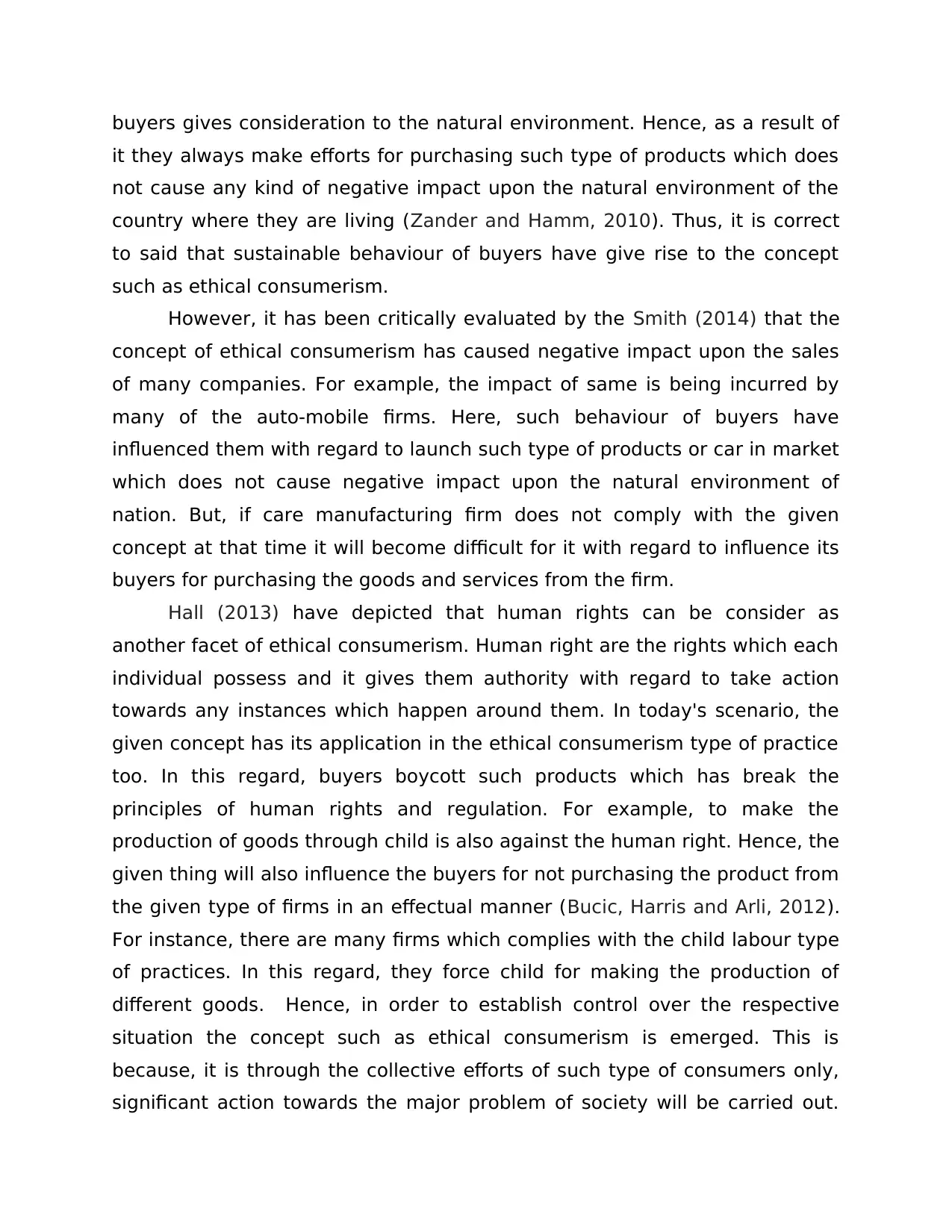
buyers gives consideration to the natural environment. Hence, as a result of
it they always make efforts for purchasing such type of products which does
not cause any kind of negative impact upon the natural environment of the
country where they are living (Zander and Hamm, 2010). Thus, it is correct
to said that sustainable behaviour of buyers have give rise to the concept
such as ethical consumerism.
However, it has been critically evaluated by the Smith (2014) that the
concept of ethical consumerism has caused negative impact upon the sales
of many companies. For example, the impact of same is being incurred by
many of the auto-mobile firms. Here, such behaviour of buyers have
influenced them with regard to launch such type of products or car in market
which does not cause negative impact upon the natural environment of
nation. But, if care manufacturing firm does not comply with the given
concept at that time it will become difficult for it with regard to influence its
buyers for purchasing the goods and services from the firm.
Hall (2013) have depicted that human rights can be consider as
another facet of ethical consumerism. Human right are the rights which each
individual possess and it gives them authority with regard to take action
towards any instances which happen around them. In today's scenario, the
given concept has its application in the ethical consumerism type of practice
too. In this regard, buyers boycott such products which has break the
principles of human rights and regulation. For example, to make the
production of goods through child is also against the human right. Hence, the
given thing will also influence the buyers for not purchasing the product from
the given type of firms in an effectual manner (Bucic, Harris and Arli, 2012).
For instance, there are many firms which complies with the child labour type
of practices. In this regard, they force child for making the production of
different goods. Hence, in order to establish control over the respective
situation the concept such as ethical consumerism is emerged. This is
because, it is through the collective efforts of such type of consumers only,
significant action towards the major problem of society will be carried out.
it they always make efforts for purchasing such type of products which does
not cause any kind of negative impact upon the natural environment of the
country where they are living (Zander and Hamm, 2010). Thus, it is correct
to said that sustainable behaviour of buyers have give rise to the concept
such as ethical consumerism.
However, it has been critically evaluated by the Smith (2014) that the
concept of ethical consumerism has caused negative impact upon the sales
of many companies. For example, the impact of same is being incurred by
many of the auto-mobile firms. Here, such behaviour of buyers have
influenced them with regard to launch such type of products or car in market
which does not cause negative impact upon the natural environment of
nation. But, if care manufacturing firm does not comply with the given
concept at that time it will become difficult for it with regard to influence its
buyers for purchasing the goods and services from the firm.
Hall (2013) have depicted that human rights can be consider as
another facet of ethical consumerism. Human right are the rights which each
individual possess and it gives them authority with regard to take action
towards any instances which happen around them. In today's scenario, the
given concept has its application in the ethical consumerism type of practice
too. In this regard, buyers boycott such products which has break the
principles of human rights and regulation. For example, to make the
production of goods through child is also against the human right. Hence, the
given thing will also influence the buyers for not purchasing the product from
the given type of firms in an effectual manner (Bucic, Harris and Arli, 2012).
For instance, there are many firms which complies with the child labour type
of practices. In this regard, they force child for making the production of
different goods. Hence, in order to establish control over the respective
situation the concept such as ethical consumerism is emerged. This is
because, it is through the collective efforts of such type of consumers only,
significant action towards the major problem of society will be carried out.
⊘ This is a preview!⊘
Do you want full access?
Subscribe today to unlock all pages.

Trusted by 1+ million students worldwide
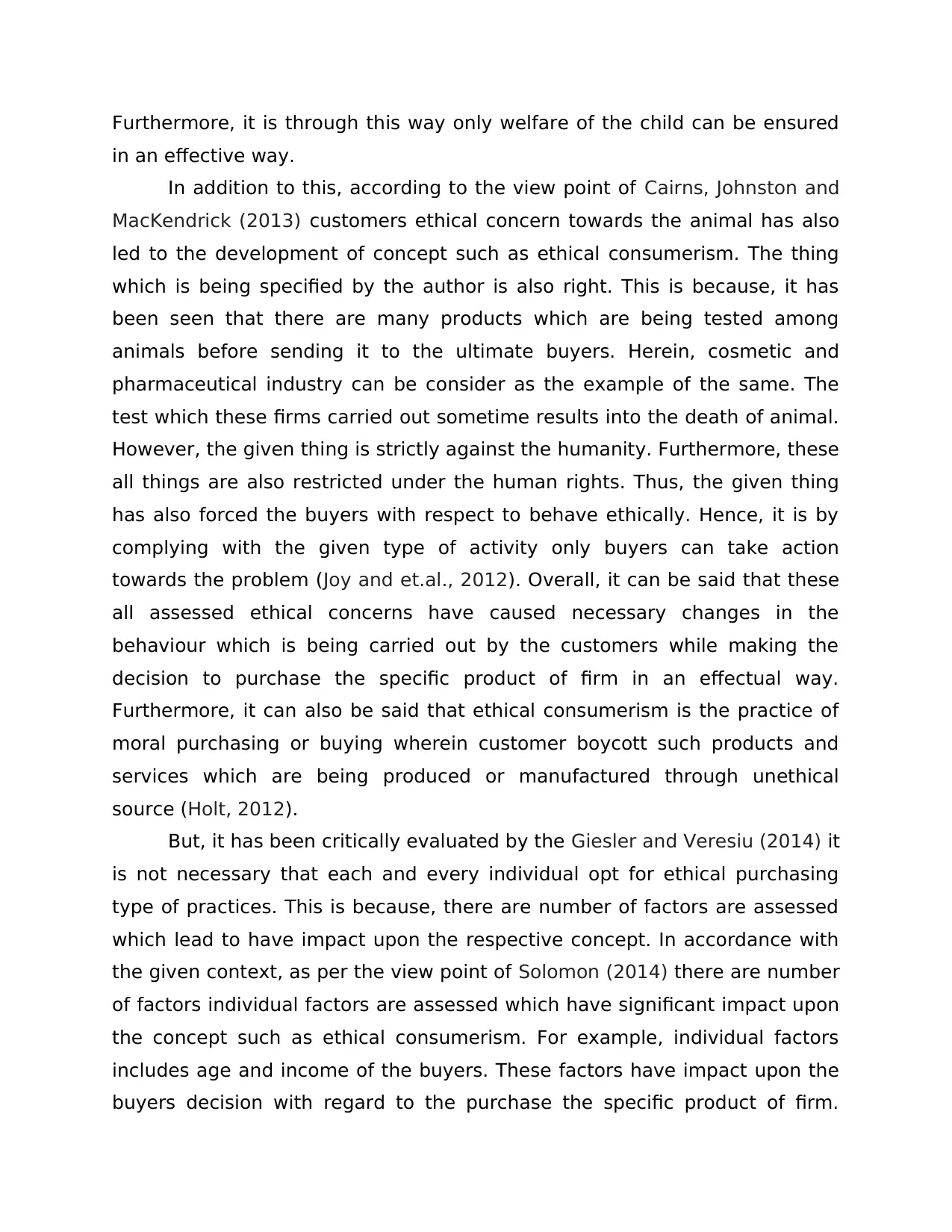
Furthermore, it is through this way only welfare of the child can be ensured
in an effective way.
In addition to this, according to the view point of Cairns, Johnston and
MacKendrick (2013) customers ethical concern towards the animal has also
led to the development of concept such as ethical consumerism. The thing
which is being specified by the author is also right. This is because, it has
been seen that there are many products which are being tested among
animals before sending it to the ultimate buyers. Herein, cosmetic and
pharmaceutical industry can be consider as the example of the same. The
test which these firms carried out sometime results into the death of animal.
However, the given thing is strictly against the humanity. Furthermore, these
all things are also restricted under the human rights. Thus, the given thing
has also forced the buyers with respect to behave ethically. Hence, it is by
complying with the given type of activity only buyers can take action
towards the problem (Joy and et.al., 2012). Overall, it can be said that these
all assessed ethical concerns have caused necessary changes in the
behaviour which is being carried out by the customers while making the
decision to purchase the specific product of firm in an effectual way.
Furthermore, it can also be said that ethical consumerism is the practice of
moral purchasing or buying wherein customer boycott such products and
services which are being produced or manufactured through unethical
source (Holt, 2012).
But, it has been critically evaluated by the Giesler and Veresiu (2014) it
is not necessary that each and every individual opt for ethical purchasing
type of practices. This is because, there are number of factors are assessed
which lead to have impact upon the respective concept. In accordance with
the given context, as per the view point of Solomon (2014) there are number
of factors individual factors are assessed which have significant impact upon
the concept such as ethical consumerism. For example, individual factors
includes age and income of the buyers. These factors have impact upon the
buyers decision with regard to the purchase the specific product of firm.
in an effective way.
In addition to this, according to the view point of Cairns, Johnston and
MacKendrick (2013) customers ethical concern towards the animal has also
led to the development of concept such as ethical consumerism. The thing
which is being specified by the author is also right. This is because, it has
been seen that there are many products which are being tested among
animals before sending it to the ultimate buyers. Herein, cosmetic and
pharmaceutical industry can be consider as the example of the same. The
test which these firms carried out sometime results into the death of animal.
However, the given thing is strictly against the humanity. Furthermore, these
all things are also restricted under the human rights. Thus, the given thing
has also forced the buyers with respect to behave ethically. Hence, it is by
complying with the given type of activity only buyers can take action
towards the problem (Joy and et.al., 2012). Overall, it can be said that these
all assessed ethical concerns have caused necessary changes in the
behaviour which is being carried out by the customers while making the
decision to purchase the specific product of firm in an effectual way.
Furthermore, it can also be said that ethical consumerism is the practice of
moral purchasing or buying wherein customer boycott such products and
services which are being produced or manufactured through unethical
source (Holt, 2012).
But, it has been critically evaluated by the Giesler and Veresiu (2014) it
is not necessary that each and every individual opt for ethical purchasing
type of practices. This is because, there are number of factors are assessed
which lead to have impact upon the respective concept. In accordance with
the given context, as per the view point of Solomon (2014) there are number
of factors individual factors are assessed which have significant impact upon
the concept such as ethical consumerism. For example, individual factors
includes age and income of the buyers. These factors have impact upon the
buyers decision with regard to the purchase the specific product of firm.
Paraphrase This Document
Need a fresh take? Get an instant paraphrase of this document with our AI Paraphraser
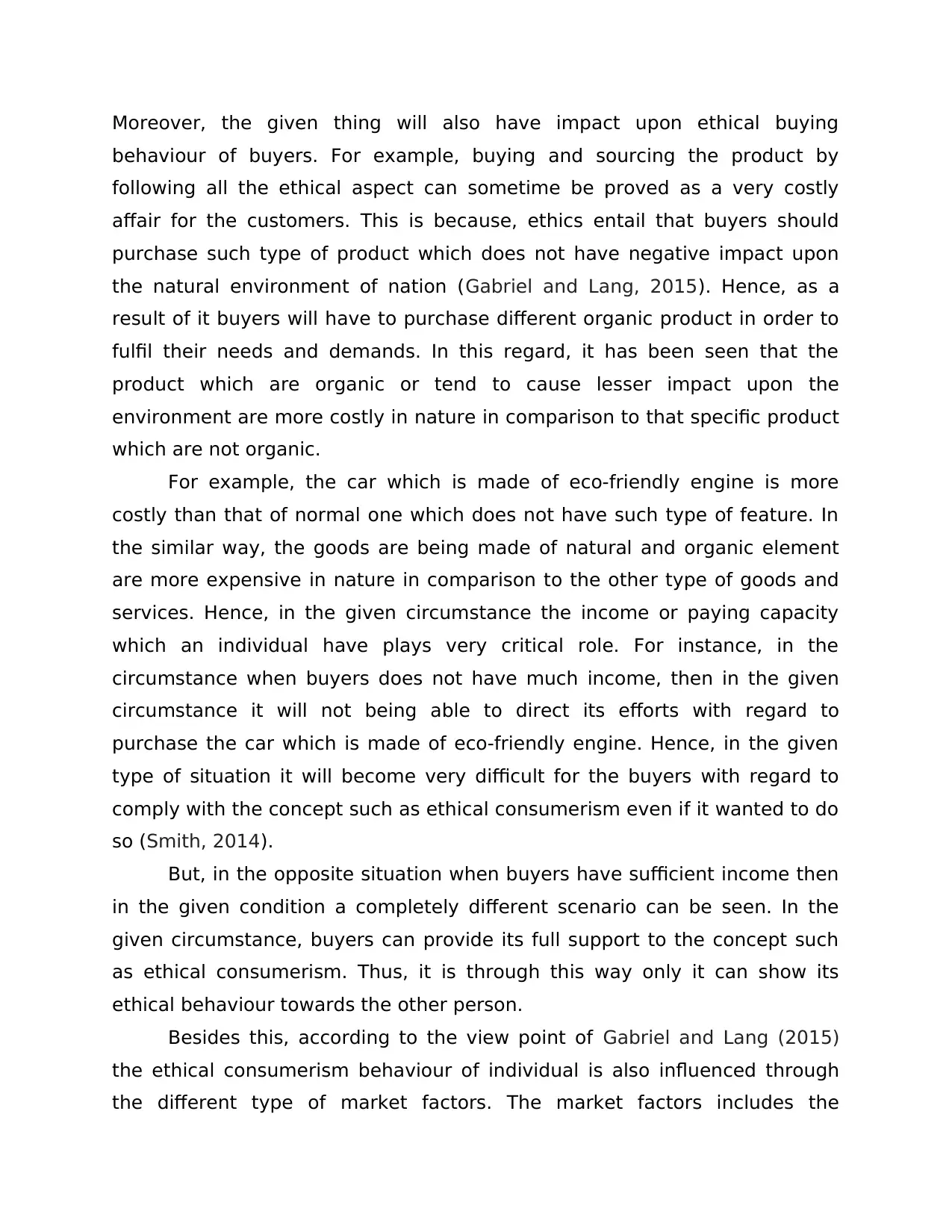
Moreover, the given thing will also have impact upon ethical buying
behaviour of buyers. For example, buying and sourcing the product by
following all the ethical aspect can sometime be proved as a very costly
affair for the customers. This is because, ethics entail that buyers should
purchase such type of product which does not have negative impact upon
the natural environment of nation (Gabriel and Lang, 2015). Hence, as a
result of it buyers will have to purchase different organic product in order to
fulfil their needs and demands. In this regard, it has been seen that the
product which are organic or tend to cause lesser impact upon the
environment are more costly in nature in comparison to that specific product
which are not organic.
For example, the car which is made of eco-friendly engine is more
costly than that of normal one which does not have such type of feature. In
the similar way, the goods are being made of natural and organic element
are more expensive in nature in comparison to the other type of goods and
services. Hence, in the given circumstance the income or paying capacity
which an individual have plays very critical role. For instance, in the
circumstance when buyers does not have much income, then in the given
circumstance it will not being able to direct its efforts with regard to
purchase the car which is made of eco-friendly engine. Hence, in the given
type of situation it will become very difficult for the buyers with regard to
comply with the concept such as ethical consumerism even if it wanted to do
so (Smith, 2014).
But, in the opposite situation when buyers have sufficient income then
in the given condition a completely different scenario can be seen. In the
given circumstance, buyers can provide its full support to the concept such
as ethical consumerism. Thus, it is through this way only it can show its
ethical behaviour towards the other person.
Besides this, according to the view point of Gabriel and Lang (2015)
the ethical consumerism behaviour of individual is also influenced through
the different type of market factors. The market factors includes the
behaviour of buyers. For example, buying and sourcing the product by
following all the ethical aspect can sometime be proved as a very costly
affair for the customers. This is because, ethics entail that buyers should
purchase such type of product which does not have negative impact upon
the natural environment of nation (Gabriel and Lang, 2015). Hence, as a
result of it buyers will have to purchase different organic product in order to
fulfil their needs and demands. In this regard, it has been seen that the
product which are organic or tend to cause lesser impact upon the
environment are more costly in nature in comparison to that specific product
which are not organic.
For example, the car which is made of eco-friendly engine is more
costly than that of normal one which does not have such type of feature. In
the similar way, the goods are being made of natural and organic element
are more expensive in nature in comparison to the other type of goods and
services. Hence, in the given circumstance the income or paying capacity
which an individual have plays very critical role. For instance, in the
circumstance when buyers does not have much income, then in the given
circumstance it will not being able to direct its efforts with regard to
purchase the car which is made of eco-friendly engine. Hence, in the given
type of situation it will become very difficult for the buyers with regard to
comply with the concept such as ethical consumerism even if it wanted to do
so (Smith, 2014).
But, in the opposite situation when buyers have sufficient income then
in the given condition a completely different scenario can be seen. In the
given circumstance, buyers can provide its full support to the concept such
as ethical consumerism. Thus, it is through this way only it can show its
ethical behaviour towards the other person.
Besides this, according to the view point of Gabriel and Lang (2015)
the ethical consumerism behaviour of individual is also influenced through
the different type of market factors. The market factors includes the
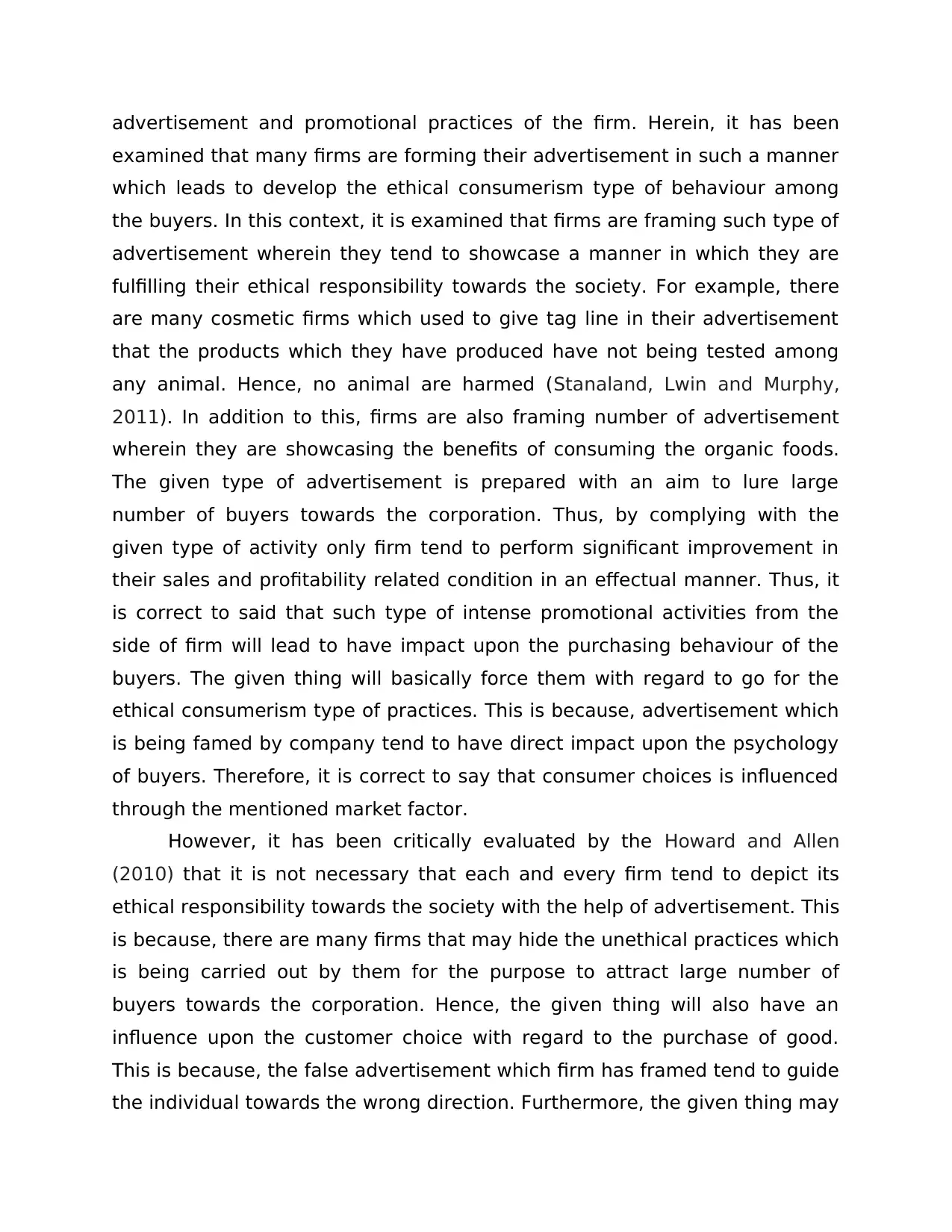
advertisement and promotional practices of the firm. Herein, it has been
examined that many firms are forming their advertisement in such a manner
which leads to develop the ethical consumerism type of behaviour among
the buyers. In this context, it is examined that firms are framing such type of
advertisement wherein they tend to showcase a manner in which they are
fulfilling their ethical responsibility towards the society. For example, there
are many cosmetic firms which used to give tag line in their advertisement
that the products which they have produced have not being tested among
any animal. Hence, no animal are harmed (Stanaland, Lwin and Murphy,
2011). In addition to this, firms are also framing number of advertisement
wherein they are showcasing the benefits of consuming the organic foods.
The given type of advertisement is prepared with an aim to lure large
number of buyers towards the corporation. Thus, by complying with the
given type of activity only firm tend to perform significant improvement in
their sales and profitability related condition in an effectual manner. Thus, it
is correct to said that such type of intense promotional activities from the
side of firm will lead to have impact upon the purchasing behaviour of the
buyers. The given thing will basically force them with regard to go for the
ethical consumerism type of practices. This is because, advertisement which
is being famed by company tend to have direct impact upon the psychology
of buyers. Therefore, it is correct to say that consumer choices is influenced
through the mentioned market factor.
However, it has been critically evaluated by the Howard and Allen
(2010) that it is not necessary that each and every firm tend to depict its
ethical responsibility towards the society with the help of advertisement. This
is because, there are many firms that may hide the unethical practices which
is being carried out by them for the purpose to attract large number of
buyers towards the corporation. Hence, the given thing will also have an
influence upon the customer choice with regard to the purchase of good.
This is because, the false advertisement which firm has framed tend to guide
the individual towards the wrong direction. Furthermore, the given thing may
examined that many firms are forming their advertisement in such a manner
which leads to develop the ethical consumerism type of behaviour among
the buyers. In this context, it is examined that firms are framing such type of
advertisement wherein they tend to showcase a manner in which they are
fulfilling their ethical responsibility towards the society. For example, there
are many cosmetic firms which used to give tag line in their advertisement
that the products which they have produced have not being tested among
any animal. Hence, no animal are harmed (Stanaland, Lwin and Murphy,
2011). In addition to this, firms are also framing number of advertisement
wherein they are showcasing the benefits of consuming the organic foods.
The given type of advertisement is prepared with an aim to lure large
number of buyers towards the corporation. Thus, by complying with the
given type of activity only firm tend to perform significant improvement in
their sales and profitability related condition in an effectual manner. Thus, it
is correct to said that such type of intense promotional activities from the
side of firm will lead to have impact upon the purchasing behaviour of the
buyers. The given thing will basically force them with regard to go for the
ethical consumerism type of practices. This is because, advertisement which
is being famed by company tend to have direct impact upon the psychology
of buyers. Therefore, it is correct to say that consumer choices is influenced
through the mentioned market factor.
However, it has been critically evaluated by the Howard and Allen
(2010) that it is not necessary that each and every firm tend to depict its
ethical responsibility towards the society with the help of advertisement. This
is because, there are many firms that may hide the unethical practices which
is being carried out by them for the purpose to attract large number of
buyers towards the corporation. Hence, the given thing will also have an
influence upon the customer choice with regard to the purchase of good.
This is because, the false advertisement which firm has framed tend to guide
the individual towards the wrong direction. Furthermore, the given thing may
⊘ This is a preview!⊘
Do you want full access?
Subscribe today to unlock all pages.

Trusted by 1+ million students worldwide
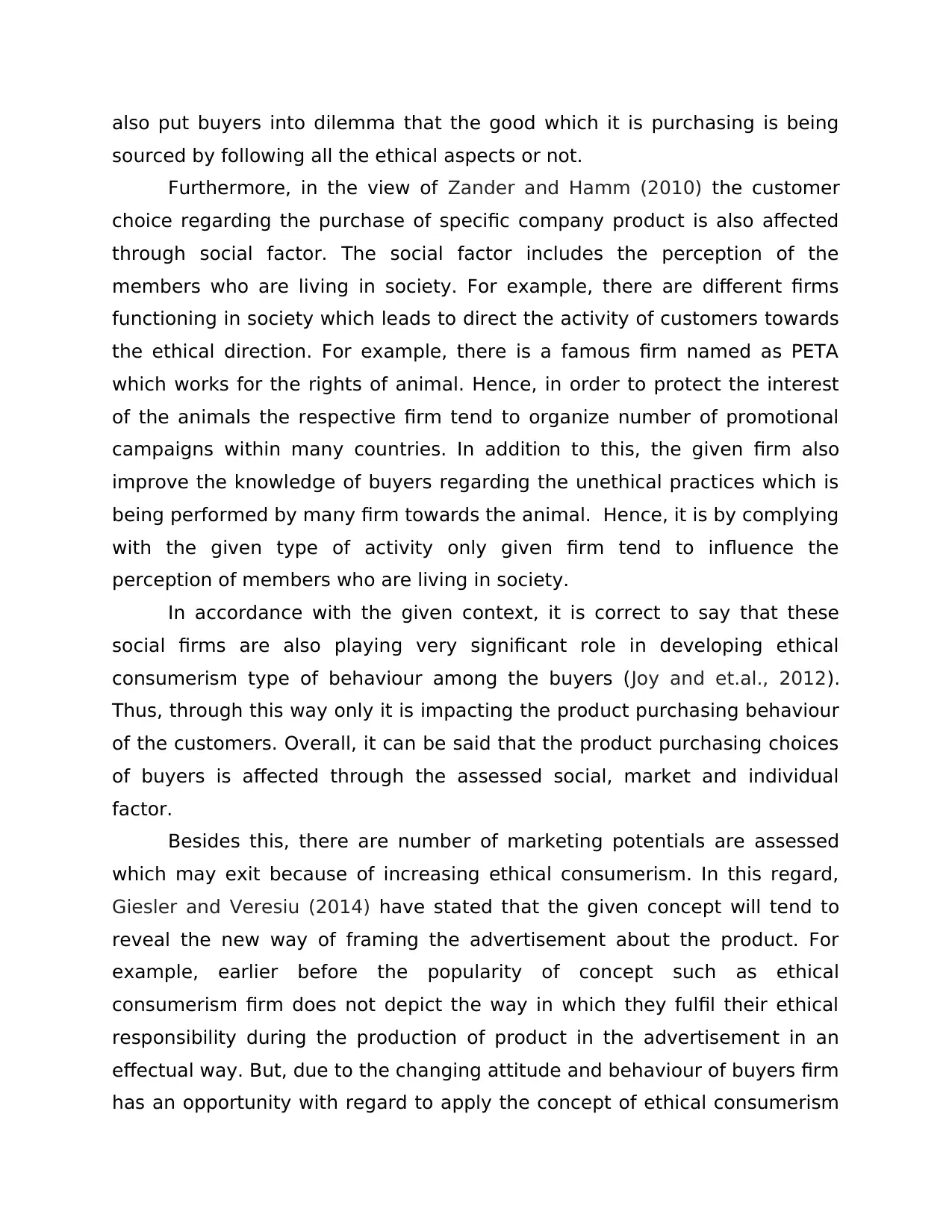
also put buyers into dilemma that the good which it is purchasing is being
sourced by following all the ethical aspects or not.
Furthermore, in the view of Zander and Hamm (2010) the customer
choice regarding the purchase of specific company product is also affected
through social factor. The social factor includes the perception of the
members who are living in society. For example, there are different firms
functioning in society which leads to direct the activity of customers towards
the ethical direction. For example, there is a famous firm named as PETA
which works for the rights of animal. Hence, in order to protect the interest
of the animals the respective firm tend to organize number of promotional
campaigns within many countries. In addition to this, the given firm also
improve the knowledge of buyers regarding the unethical practices which is
being performed by many firm towards the animal. Hence, it is by complying
with the given type of activity only given firm tend to influence the
perception of members who are living in society.
In accordance with the given context, it is correct to say that these
social firms are also playing very significant role in developing ethical
consumerism type of behaviour among the buyers (Joy and et.al., 2012).
Thus, through this way only it is impacting the product purchasing behaviour
of the customers. Overall, it can be said that the product purchasing choices
of buyers is affected through the assessed social, market and individual
factor.
Besides this, there are number of marketing potentials are assessed
which may exit because of increasing ethical consumerism. In this regard,
Giesler and Veresiu (2014) have stated that the given concept will tend to
reveal the new way of framing the advertisement about the product. For
example, earlier before the popularity of concept such as ethical
consumerism firm does not depict the way in which they fulfil their ethical
responsibility during the production of product in the advertisement in an
effectual way. But, due to the changing attitude and behaviour of buyers firm
has an opportunity with regard to apply the concept of ethical consumerism
sourced by following all the ethical aspects or not.
Furthermore, in the view of Zander and Hamm (2010) the customer
choice regarding the purchase of specific company product is also affected
through social factor. The social factor includes the perception of the
members who are living in society. For example, there are different firms
functioning in society which leads to direct the activity of customers towards
the ethical direction. For example, there is a famous firm named as PETA
which works for the rights of animal. Hence, in order to protect the interest
of the animals the respective firm tend to organize number of promotional
campaigns within many countries. In addition to this, the given firm also
improve the knowledge of buyers regarding the unethical practices which is
being performed by many firm towards the animal. Hence, it is by complying
with the given type of activity only given firm tend to influence the
perception of members who are living in society.
In accordance with the given context, it is correct to say that these
social firms are also playing very significant role in developing ethical
consumerism type of behaviour among the buyers (Joy and et.al., 2012).
Thus, through this way only it is impacting the product purchasing behaviour
of the customers. Overall, it can be said that the product purchasing choices
of buyers is affected through the assessed social, market and individual
factor.
Besides this, there are number of marketing potentials are assessed
which may exit because of increasing ethical consumerism. In this regard,
Giesler and Veresiu (2014) have stated that the given concept will tend to
reveal the new way of framing the advertisement about the product. For
example, earlier before the popularity of concept such as ethical
consumerism firm does not depict the way in which they fulfil their ethical
responsibility during the production of product in the advertisement in an
effectual way. But, due to the changing attitude and behaviour of buyers firm
has an opportunity with regard to apply the concept of ethical consumerism
Paraphrase This Document
Need a fresh take? Get an instant paraphrase of this document with our AI Paraphraser
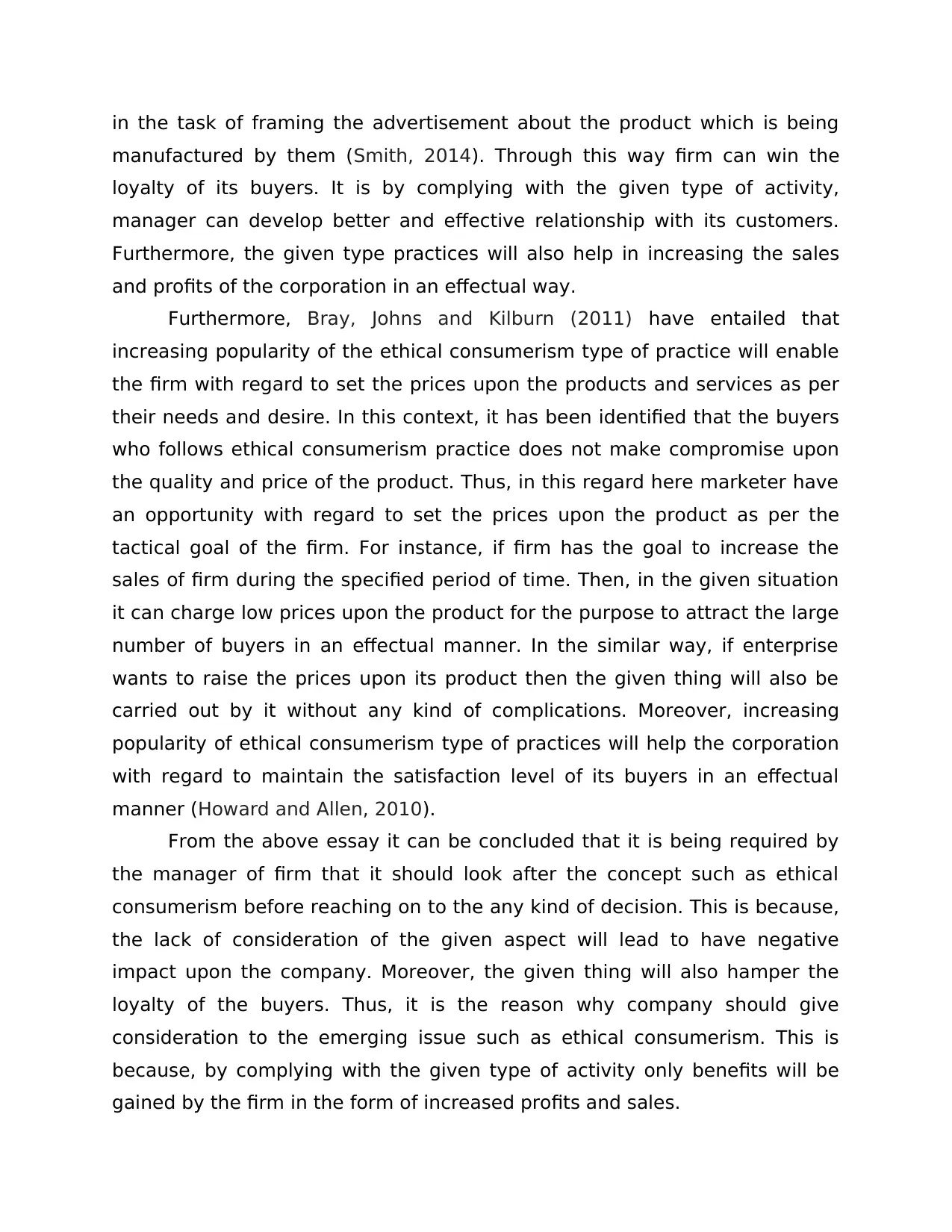
in the task of framing the advertisement about the product which is being
manufactured by them (Smith, 2014). Through this way firm can win the
loyalty of its buyers. It is by complying with the given type of activity,
manager can develop better and effective relationship with its customers.
Furthermore, the given type practices will also help in increasing the sales
and profits of the corporation in an effectual way.
Furthermore, Bray, Johns and Kilburn (2011) have entailed that
increasing popularity of the ethical consumerism type of practice will enable
the firm with regard to set the prices upon the products and services as per
their needs and desire. In this context, it has been identified that the buyers
who follows ethical consumerism practice does not make compromise upon
the quality and price of the product. Thus, in this regard here marketer have
an opportunity with regard to set the prices upon the product as per the
tactical goal of the firm. For instance, if firm has the goal to increase the
sales of firm during the specified period of time. Then, in the given situation
it can charge low prices upon the product for the purpose to attract the large
number of buyers in an effectual manner. In the similar way, if enterprise
wants to raise the prices upon its product then the given thing will also be
carried out by it without any kind of complications. Moreover, increasing
popularity of ethical consumerism type of practices will help the corporation
with regard to maintain the satisfaction level of its buyers in an effectual
manner (Howard and Allen, 2010).
From the above essay it can be concluded that it is being required by
the manager of firm that it should look after the concept such as ethical
consumerism before reaching on to the any kind of decision. This is because,
the lack of consideration of the given aspect will lead to have negative
impact upon the company. Moreover, the given thing will also hamper the
loyalty of the buyers. Thus, it is the reason why company should give
consideration to the emerging issue such as ethical consumerism. This is
because, by complying with the given type of activity only benefits will be
gained by the firm in the form of increased profits and sales.
manufactured by them (Smith, 2014). Through this way firm can win the
loyalty of its buyers. It is by complying with the given type of activity,
manager can develop better and effective relationship with its customers.
Furthermore, the given type practices will also help in increasing the sales
and profits of the corporation in an effectual way.
Furthermore, Bray, Johns and Kilburn (2011) have entailed that
increasing popularity of the ethical consumerism type of practice will enable
the firm with regard to set the prices upon the products and services as per
their needs and desire. In this context, it has been identified that the buyers
who follows ethical consumerism practice does not make compromise upon
the quality and price of the product. Thus, in this regard here marketer have
an opportunity with regard to set the prices upon the product as per the
tactical goal of the firm. For instance, if firm has the goal to increase the
sales of firm during the specified period of time. Then, in the given situation
it can charge low prices upon the product for the purpose to attract the large
number of buyers in an effectual manner. In the similar way, if enterprise
wants to raise the prices upon its product then the given thing will also be
carried out by it without any kind of complications. Moreover, increasing
popularity of ethical consumerism type of practices will help the corporation
with regard to maintain the satisfaction level of its buyers in an effectual
manner (Howard and Allen, 2010).
From the above essay it can be concluded that it is being required by
the manager of firm that it should look after the concept such as ethical
consumerism before reaching on to the any kind of decision. This is because,
the lack of consideration of the given aspect will lead to have negative
impact upon the company. Moreover, the given thing will also hamper the
loyalty of the buyers. Thus, it is the reason why company should give
consideration to the emerging issue such as ethical consumerism. This is
because, by complying with the given type of activity only benefits will be
gained by the firm in the form of increased profits and sales.
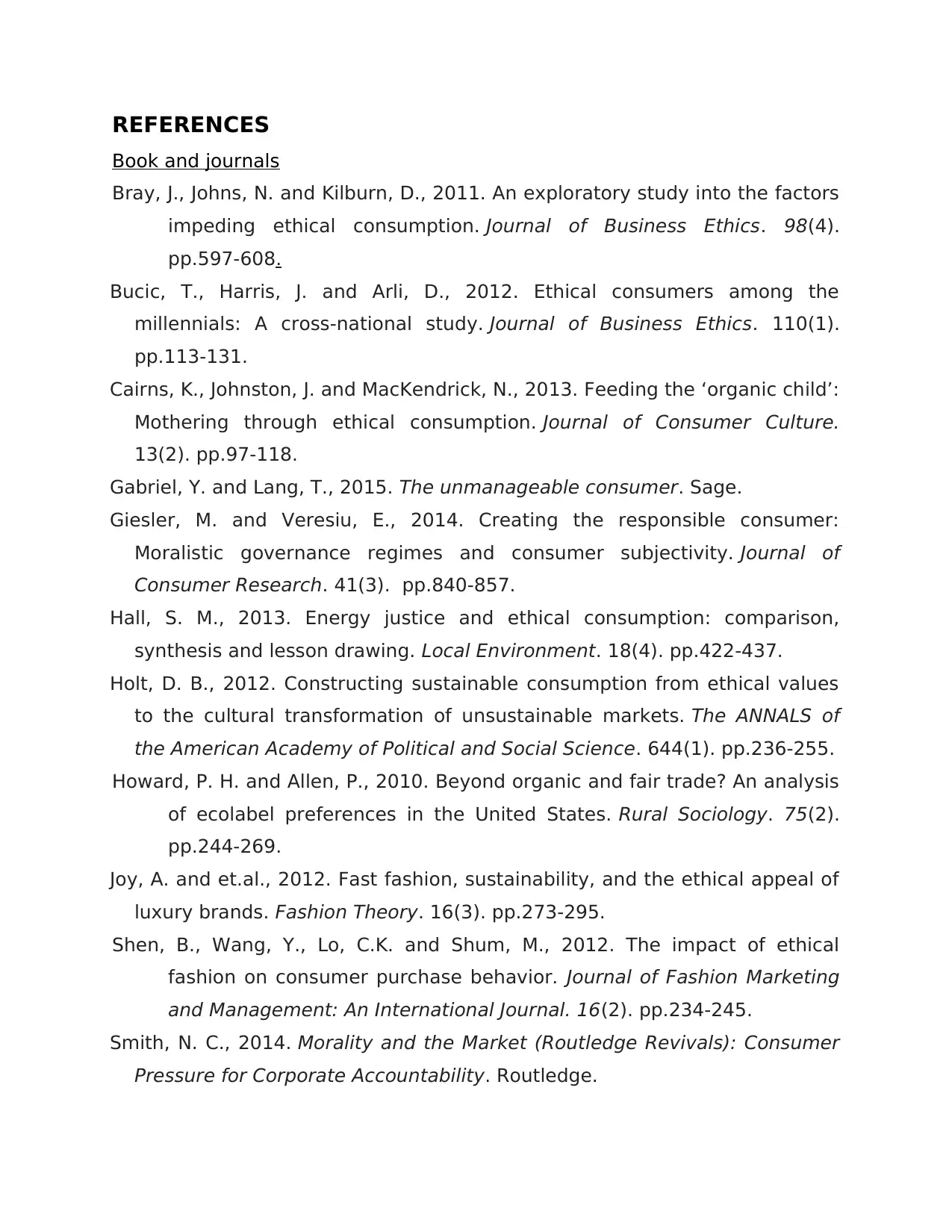
REFERENCES
Book and journals
Bray, J., Johns, N. and Kilburn, D., 2011. An exploratory study into the factors
impeding ethical consumption. Journal of Business Ethics. 98(4).
pp.597-608.
Bucic, T., Harris, J. and Arli, D., 2012. Ethical consumers among the
millennials: A cross-national study. Journal of Business Ethics. 110(1).
pp.113-131.
Cairns, K., Johnston, J. and MacKendrick, N., 2013. Feeding the ‘organic child’:
Mothering through ethical consumption. Journal of Consumer Culture.
13(2). pp.97-118.
Gabriel, Y. and Lang, T., 2015. The unmanageable consumer. Sage.
Giesler, M. and Veresiu, E., 2014. Creating the responsible consumer:
Moralistic governance regimes and consumer subjectivity. Journal of
Consumer Research. 41(3). pp.840-857.
Hall, S. M., 2013. Energy justice and ethical consumption: comparison,
synthesis and lesson drawing. Local Environment. 18(4). pp.422-437.
Holt, D. B., 2012. Constructing sustainable consumption from ethical values
to the cultural transformation of unsustainable markets. The ANNALS of
the American Academy of Political and Social Science. 644(1). pp.236-255.
Howard, P. H. and Allen, P., 2010. Beyond organic and fair trade? An analysis
of ecolabel preferences in the United States. Rural Sociology. 75(2).
pp.244-269.
Joy, A. and et.al., 2012. Fast fashion, sustainability, and the ethical appeal of
luxury brands. Fashion Theory. 16(3). pp.273-295.
Shen, B., Wang, Y., Lo, C.K. and Shum, M., 2012. The impact of ethical
fashion on consumer purchase behavior. Journal of Fashion Marketing
and Management: An International Journal. 16(2). pp.234-245.
Smith, N. C., 2014. Morality and the Market (Routledge Revivals): Consumer
Pressure for Corporate Accountability. Routledge.
Book and journals
Bray, J., Johns, N. and Kilburn, D., 2011. An exploratory study into the factors
impeding ethical consumption. Journal of Business Ethics. 98(4).
pp.597-608.
Bucic, T., Harris, J. and Arli, D., 2012. Ethical consumers among the
millennials: A cross-national study. Journal of Business Ethics. 110(1).
pp.113-131.
Cairns, K., Johnston, J. and MacKendrick, N., 2013. Feeding the ‘organic child’:
Mothering through ethical consumption. Journal of Consumer Culture.
13(2). pp.97-118.
Gabriel, Y. and Lang, T., 2015. The unmanageable consumer. Sage.
Giesler, M. and Veresiu, E., 2014. Creating the responsible consumer:
Moralistic governance regimes and consumer subjectivity. Journal of
Consumer Research. 41(3). pp.840-857.
Hall, S. M., 2013. Energy justice and ethical consumption: comparison,
synthesis and lesson drawing. Local Environment. 18(4). pp.422-437.
Holt, D. B., 2012. Constructing sustainable consumption from ethical values
to the cultural transformation of unsustainable markets. The ANNALS of
the American Academy of Political and Social Science. 644(1). pp.236-255.
Howard, P. H. and Allen, P., 2010. Beyond organic and fair trade? An analysis
of ecolabel preferences in the United States. Rural Sociology. 75(2).
pp.244-269.
Joy, A. and et.al., 2012. Fast fashion, sustainability, and the ethical appeal of
luxury brands. Fashion Theory. 16(3). pp.273-295.
Shen, B., Wang, Y., Lo, C.K. and Shum, M., 2012. The impact of ethical
fashion on consumer purchase behavior. Journal of Fashion Marketing
and Management: An International Journal. 16(2). pp.234-245.
Smith, N. C., 2014. Morality and the Market (Routledge Revivals): Consumer
Pressure for Corporate Accountability. Routledge.
⊘ This is a preview!⊘
Do you want full access?
Subscribe today to unlock all pages.

Trusted by 1+ million students worldwide
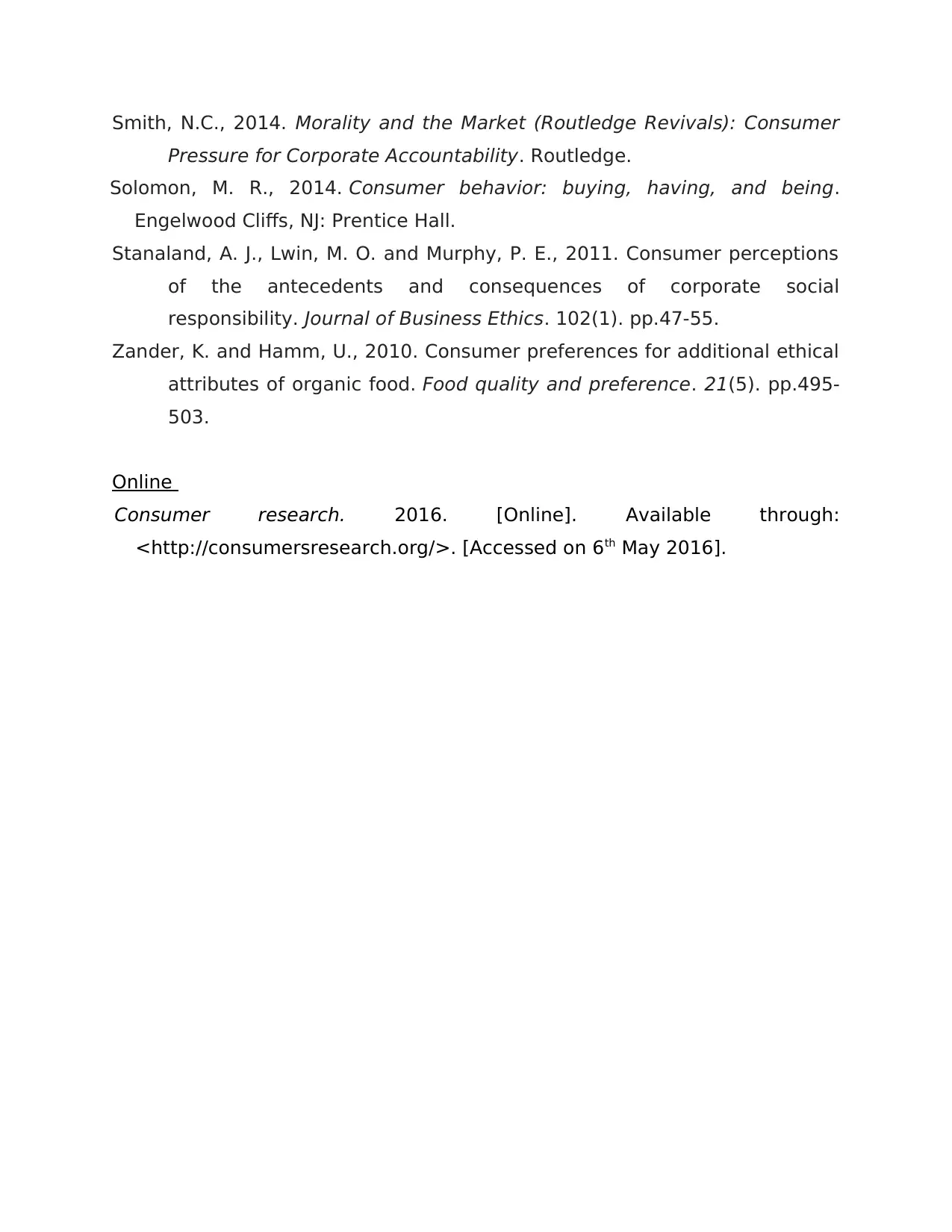
Smith, N.C., 2014. Morality and the Market (Routledge Revivals): Consumer
Pressure for Corporate Accountability. Routledge.
Solomon, M. R., 2014. Consumer behavior: buying, having, and being.
Engelwood Cliffs, NJ: Prentice Hall.
Stanaland, A. J., Lwin, M. O. and Murphy, P. E., 2011. Consumer perceptions
of the antecedents and consequences of corporate social
responsibility. Journal of Business Ethics. 102(1). pp.47-55.
Zander, K. and Hamm, U., 2010. Consumer preferences for additional ethical
attributes of organic food. Food quality and preference. 21(5). pp.495-
503.
Online
Consumer research. 2016. [Online]. Available through:
<http://consumersresearch.org/>. [Accessed on 6th May 2016].
Pressure for Corporate Accountability. Routledge.
Solomon, M. R., 2014. Consumer behavior: buying, having, and being.
Engelwood Cliffs, NJ: Prentice Hall.
Stanaland, A. J., Lwin, M. O. and Murphy, P. E., 2011. Consumer perceptions
of the antecedents and consequences of corporate social
responsibility. Journal of Business Ethics. 102(1). pp.47-55.
Zander, K. and Hamm, U., 2010. Consumer preferences for additional ethical
attributes of organic food. Food quality and preference. 21(5). pp.495-
503.
Online
Consumer research. 2016. [Online]. Available through:
<http://consumersresearch.org/>. [Accessed on 6th May 2016].
Paraphrase This Document
Need a fresh take? Get an instant paraphrase of this document with our AI Paraphraser

1 out of 11
Related Documents
Your All-in-One AI-Powered Toolkit for Academic Success.
+13062052269
info@desklib.com
Available 24*7 on WhatsApp / Email
![[object Object]](/_next/static/media/star-bottom.7253800d.svg)
Unlock your academic potential
Copyright © 2020–2026 A2Z Services. All Rights Reserved. Developed and managed by ZUCOL.





